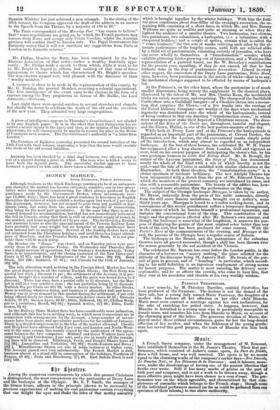Ot Among the numerous entertainments by which this present Christmas
is distinguished, the most conspicuous are the pantomime at Drury Lane and the burlesque at the Olympic. Mr. E. T. Smith, the manager of the former house, adheres to the principle (shown to be successful by previous experiments) of making his vast pantomime contain everything that can delight the eyes and shake the sides of that motley assembly
which is brought together by the winter holidays. With him the festi- val piece constitutes about four-fifths of the evening's recreation, the re- maining fifth consisting of a short farce, in which Mr. and Mrs. Barney Williams are quite as audible and quite as amusing as when they de-. lighted the audience of a smaller theatre. Two harlequins, two clowns,
two pantaloons, two columbines, a harlequina, (i. e. a columbine with a
chequered boddice,) and a couple of sprites sustain what i3 called the "comic business," the two sets of masks relieving each other by the al- ternate performance of the lengthy scenes, until both are relieved alike by a third set of pantomimists, consisting entirely of juveniles, who have one scene wholly to themselves. A "transformation" wonder, which
exhibits glittering fairies growing out of forest-frees, and a Watteau-like representation of a pastoral haunt, are Mr. W. Beverley's contributions for the present year, equalling, if they do not exceed, all that he has hitherto done in the way of pantomimic decoration. Liberal in every other respect, the coneoctors of the Drury Lane pantomime, Robin Hood, have, however, been parsimonious in the article of tricks—that is to say, the mechanical changes supposed to be effected by means of harlequin's bat.
At the Princess's, on the other hand, where the pantomime is of much smaller dimensions being merely the supplement to the classical plays, illustrated by the talent of Mr. and Mrs. Charles Kean, the mechanical tricks are novel, numerous, and surprising. The changes of the Smithfield Cattle-show into a Guildhall banquet—of a Cheshire cheese into a mouse- trap that surprises the Clown,—of a few trunks into the carriage of the Parcel Delivery Company—are worthy of the days when mechanical ingenuity was distributed over the whole of the harlequinade, instead of being confined to that one dazzling " transformation-seene," in which most managers now stake their hopes of a Christmas success. The deco- rations of the King of the Castle are' throughout, tasteful and elegant, and the Clown, Hulini, is one of the best posture-masters of the day. While both at Drury Lane and at the Princess's the harlequinade is regarded as an important part of the pantomime, at Covent Garden, the Haymarket, and the Lyceum, the old conventional masks simply point off the introduction, which may almost be regarded as an independent burlesque. At the first of these houses, the celebrated Mr. W. H. Payne has reappeared after a long absence from London, droll and vigorous as ever, bent on his ancient purpose of anticipating the clown's fun, by his own grotesque humour in Little Red Riding Hood. Mr. R. Brough, the author of the Lyceum pantomime, the Siege of Troy, has dramatized nearly the whole of the Iliad with a wit of which brevity is not the soul,—and the tale of Undine is unfolded with similar elaboration at the Haymarket. At both these theatres, the " transformation-scene " is a choice specimen of intricate brilliancy. The new Adelphi Theatre has been inaugurated with a sketch from the pen of Mr. Edmund Yates, in which the members of the present company are introduced by name, and also with a seasonable pantomime. The beauty of the edifice has, how- ever, excited more attention than the performance on the stage. The subject of the Olympic burlesque Mamma, is taken by its author, Mr. Byron, indirectly from the poem of his noble namesake, directly from the still more famous melodrama, brought out at Astley's, some thirty years ago. Mazcppa is bound to a wooden rocking-horse, and in consequence of this severe punishment suffers a temporary derangement, in the course of which he fancies himself a professional equestrian, and imitates the conventional feats of the ring. This combination of the tragic and the grotesque is effected after Mr. Robson's own manner, and though the burlesque is somewhat of the lengthiest, it answers the pur- pose of displaying the genius of this most original actor better than any work of the sort, that has been produced for some seasons. With the Porter's Knot at the commencement of the evening, and Mazeppa at the end, the patrons of the Olympic have a regular course of Robson.
The burlesque at the Strand, and the pantomimes of the suburban theatres have all proved successful, though a chill has been thrown over the season generally by the sad accident at the Victoria.
The celebrated Mr. Barnum has come before the London public, in the character of a lecturer on "money making," the place selected for the delivery of his discourse being St. James's Hall. He treats of the pur- suit of gain in general, and of " humbug " in particular, which accord- ing to his mild definition is an ingenious employment of strong means for honest purposes. His matter is most amusing, his delivery unex- ceptionable' and he so affects the crowds, who come to hear him, that they roar at his anecdotes and chuckle at his very worldly wisdom.






































 Previous page
Previous page